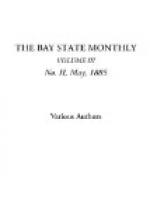“Yes, you have offended me,” he said. “I have no right to comment on your actions in general.”
“None whatever.”
“But what I do have a right to demand is an explanation from you of conduct so strange as to be unaccountable.”
She flushed a little.
“It’s not pleasant,” she answered, “when one has done the best that opened up to be told that it’s unaccountable conduct.”
“Then it was you? I was sure of it.” She looked at him earnestly.
“Why should there be any beating about the bush?” she answered. “I should like it better if you need never have known; but, since you were sure to find it out sooner or later, it might as well come now. What I have done is wise and right, the most satisfactory thing to me, and to others wiser than I. But I wish you would never speak of it.”
“Never speak of your coming forward with your whole fortune to make up the loss that this fellow’s claim will be to us? Never speak of it!” cried Archdale. “And accept it? From you? You certainly have a flattering opinion of me.”
“If it were like any business losses,” she said, “it would be different. But this is something nobody could have been prepared for; it needs something outside of the routine to meet it.” She waited a moment. “Will you put your case, as you said you were going to do?” she asked. “It will make it clearer, and you will see that there is nothing extraordinary. I think you need not say anything more about—about us, that is all understood. Go on from there.”
“A father and a son, then, are nominally in business together,” he answered; “the father does the work; the son has a generous share of the profits. Matters are going on swimmingly. Suddenly a claimant turns up who wants a grand slice of the property. He is the only son of the father’s elder brother,—a being who was not known to have existed, that is, who was supposed to have died when an infant. The father, my father, was named for him, and my grandfather’s will gave the largest share of his fortune to his oldest son, Walter, whom he supposed to be my father, but who was really Gerald Edmonson’s father—if the fellow’s proofs turn out valid; they are having a thorough overhauling. My uncle does not suffer; it is only we. I am sorry,” he added, “that you are liable to be in any way connected with loss, but at the worst it is so remotely that it will never affect you. As for the other matter, the story,”—he stopped with a movement of irritation, perhaps of some deeper feeling,—“that must be borne as best it can, nothing of that falls upon you, certainly. How the matter concerns a young lady at all I can’t imagine; so I fail to see what interest you can have in it, or what right to move in it.”




